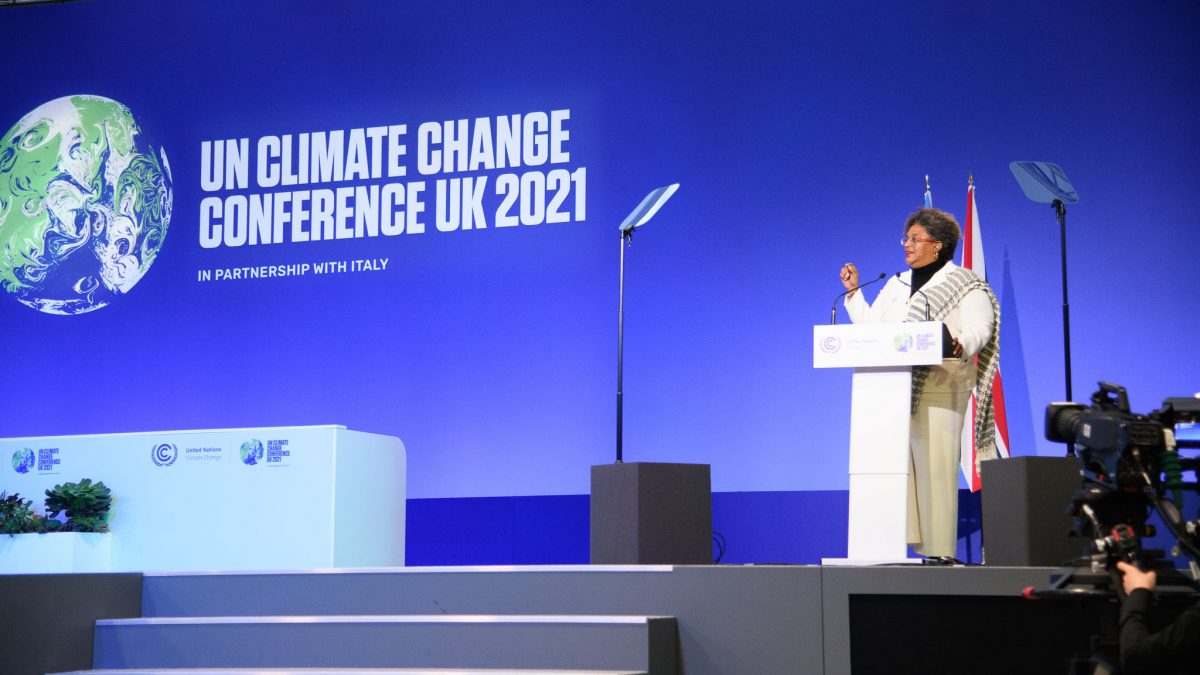Barbadian Prime Minister Mia Mottley called out the powerful nations for their inaction when it comes to combatting the effects of climate change while highlighting the fact that the slightest rise in global temperatures continues to have devastating effects on the frontline countries.
In her address to the United Nations’ 26th Climate Change Conference of Parties (COP26) on Monday, Prime Minister Mottley explained that the COVID-19 pandemic has taught the world that national solutions to global problems do not work.
“For those who have eyes to see, for those who have ears to listen and for those who have a heart to feel, 1.5 is what we need to survive. 2 degrees, yes S-G (Secretary-General), is a death sentence for the people of Antigua and Barbuda, for the people of the Maldives, for the people of Dominica and Fiji, for the people of Kenya and Mozambique, and yes, for the people of Samoa and Barbados.
“We do not want that dreaded death sentence and we have come here today to say: Try harder. Try harder because our people, the climate army, the world, the planet need our actions now, not next year, not in the next decade,” she said during an impassioned plea for change.
Mottley identified mitigation, climate pledges and adaptation as the three gaps that need to be closed before COP26 could be declared as a success a well as delivery on the promises of the 2015 Paris Agreement.
“…What must we say to our people living on the frontline in the Caribbean, in Africa, Latin America, in the Pacific, when both ambition and regrettably some of the needed faces at Glasgow are not present? What excuse should we give for the failure…?” she questioned.
Mottley called on her fellow leaders to take the mantle and lead the way they were elected to.
“Do some leaders in this world believe that they can survive and thrive on their own? Have they not learned from the pandemic? Can there be peace and prosperity if one-third of the world literally prospers and the other two-thirds of the world live under siege and face calamitous threats to our wellbeing? What the world needs now, my friends is that which is within the ambit of less than 200 persons who are willing and prepared to lead. Leaders must not fail those who elected them to lead,” she said.
Financing
Mottley was also critical of leaders for making commitments based on yet to be developed technologies which she branded as both reckless and dangerous, as well as the failure to deliver on promised finance for mitigation and adaptation.
“…Adaptation finance remains only at 25%; not the 50-50 split that was promised, nor needed, given the warming that is already taking place on this Earth. Climate finance to frontline small island developing states declined by 25% in 2019. Failure to provide the critical finance and that of loss and damage is measured in, my friends, in lives and livelihoods in our communities. This is immoral and it is unjust,” the Caribbean leader explained.
She added that leaders must commit to addressing the pressing issues in a holistic manner. Mottley said many of the nations on the frontlines are relatively young and still developing and that they wish to exist in the next 100 years.
Speaking to the need to take action, Mottley said “if we don’t, we will allow the path of greed and selfishness to sow the seeds of our common destruction. The leaders of today, not 2030, not 2050, must make this choice. It is in our hands and our people and our planet need it more than ever.”
She pointed to the fact that over the last 13 years, the central banks of the wealthiest countries engaged in US$25 trillion of quantitative easing and that some US$9 trillion was used in the last 18 months to fight the COVID-19 pandemic.
Mottley said that has that US$25 trillion been used to purchase bonds to finance the energy transition or the transition of how the world eats or how it moves, then it would have been on the path to reaching the vital 1.5 degrees.
“I say to you, today, in Glasgow that an annual increase in the [special drawing rights] of US$500 billion a year for 20 years, put in a trust to finance the transition, is the real gap Secretary-General that we need to close, not the $50 billion being proposed for adaptation. And if $500 billion sounds big to you, guess what? It is just 2% of the $25 trillion. This is the sword we need to wield,” she said.
The United Nations Intergovernmental Panel on Climate Change (IPCC) had warned that the scale of human-induced changes across the climate system is “unprecedented” and climate extremes are affecting every region across the globe.
The IPCC’s also concluded that atmospheric levels of carbon dioxide have not been this high in at least 2 million years, and the past decade is likely the hottest the planet has been in 125,000 years.
It has noted that the climate crisis has resulted in an increase in extreme weather events, particularly in the Caribbean and Pacific.
At the Copenhagen climate summit (COP25) in 2009, wealthy nations agreed to provide $100 billion annually by 2020 to help developing countries adapt to climate change and transition to clean, renewable energy like wind and solar. That promise has yet to be met.






